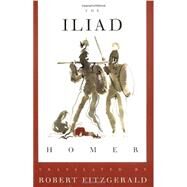- ISBN: 9780374529055 | 0374529051
- Cover: Paperback
- Copyright: 4/3/2004
Anger be now your song, immortal one, Akhilleus' anger, doomed and ruinous, that caused the Akhaians loss on bitter loss and crowded brave souls into the undergloom, leaving so many dead men-carrion for dogs and birds; and the will of Zeus was done. -Lines 1-6 Since it was first published more than twenty-five years ago, Robert Fitzgerald's prizewinning translation of Homer's battle epic has become a classic in its own right: a standard against which all other versions ofThe Iliadare compared. Fitzgerald's work is accessible, ironic, faithful, written in a swift vernacular blank verse that "makes Homer live as never before" (Library Journal). This edition includes a new foreword by Andrew Ford. Robert Fitzgerald's translations ofThe Iliad,The Odyssey,The Aeneid, and the Oedipus plays of Sophocles (created with Dudley Fitts) are modern classics. An admired poet and teacher of writing, Fitzgerald died in 1985. Winner of the Harold Morton Landon Translation Award Since it was first published more than twenty-five years ago, Robert Fitzgerald's prizewinning translation of Homer's battle epic has become a classic in its own right: a standard against which all other versions ofThe Iliadare compared. Fitzgerald's work is accessible, ironic, faithful, and written in a swift vernacular blank verse that brings Homer's saga to life. In an introduction written especially for this edition, Andrew Ford, professor of classics at Princeton University and author ofHomer: The Poetry of the Past, situatesThe Iliadboth in the widespread ancient tradition of heroic songs and in relation to the specific concerns of archaic Greece, while also fully illuminating the strength of storytelling that is this poem's greatest enduring legacy. Fitzgerald's definitive translation of Homer's epic is timeless in its authority and always fresh in its vivid rendering of the preeminent war story of the Western world. Winner of the Harold Morton Landon Translation Award "This is a masterpiece and will surely rank as one of the best translations of a classic in the English language . . . This is for every reader in our time and possibly for all time."Library Journal "Mr. Fitzgerald has solved virtually every problem that has plagued translators of Homer. The narrative runs, the dialogue speaks, the military action is clear, and the repetitive epithets become useful text rather than exotic relics. Aside from the ability to write poetry, Mr. Fitzgerald's success derives from the use of a predominately Anglo-Saxon vocabulary, a concentration on specific meanings, and an occasional arbitrary, but highly effective, substitution of implication for literal sense. Odysseus becomes 'the great tactician,' which is not at all what Homer called him, but is almost certainly the modern equivalent of what Homer's audience understood."The Atlantic Monthly "[Robert Fitzgerald'sOdysseyandIliad] open up once more the unique greatness of Homer's art [and] the brilliant texture of Homeric verse."The Yale Review "What an age can read in Homer, what its translators can manage to say in his presence, is one gauge of its morale, one index to its system of exultations and reticences. The supple, the iridescent, the ironic, these modes are among our strengths, and among Fitzgerald's."National Review "This is a masterpiece and will surely rank as one of the best translations of a classic in the English language. It surpasses by far Richard Lattimore's, which has been heretofore the most popular modern version. Lattimore uses a cumbersome six-beat line which though euphonious is syntactically enslaved to the Greek. Fitzgerald's swift rhythms, bright images, and superb Englis







